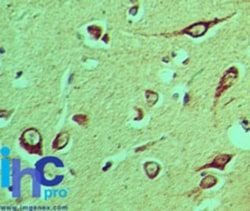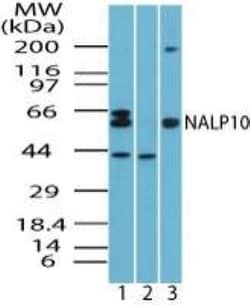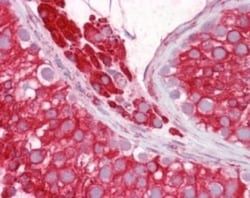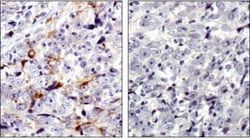NOD1 Antibody, Novus Biologicals™
Rabbit Polyclonal Antibody has been used in 3 publications
Manufacturer: Fischer Scientific
The price for this product is unavailable. Please request a quote
Antigen
NOD1
Applications
Western Blot, Immunohistochemistry (Paraffin)
Conjugate
Unconjugated
Host Species
Rabbit
Research Discipline
Apoptosis, Asthma, Autophagy, Immunology
Formulation
Whole antisera with 50% Glycerol with 0.025% Sodium Azide
Gene Alias
CARD4NLR family, CARD domain containing 1, caspase recruitment domain family, member 4, Caspase recruitment domain-containing protein 4, CLR7.1, NLRC1, nucleotide-binding oligomerization domain containing 1, nucleotide-binding oligomerization domain, leucine rich repeat and CARD domaincontaining 1, nucleotide-binding oligomerization domain-containing protein 1
Gene Symbols
NOD1
Isotype
IgG
Purification Method
Unpurified
Test Specificity
Cross reacts with Human. Predicted to cross react with New World Monkey and Mouse.
Dilution
Western Blot 1:1000-1:2500, Immunohistochemistry-Paraffin 1:100
Classification
Polyclonal
Form
Antisera
Regulatory Status
RUO
Target Species
Human
Gene Accession No.
Q9Y239
Gene ID (Entrez)
10392
Immunogen
Amino acids 930-949 of human NOD1 protein were used as the immunogen for this antibody.
Primary or Secondary
Primary
Content And Storage
Store at 4C short term. Aliquot and store at -20C long term. Avoid freeze-thaw cycles.
Description
- NOD1 Polyclonal specifically detects NOD1 in Human, Mouse samples
- It is validated for Western Blot, Immunohistochemistry, Immunohistochemistry-Paraffin.






